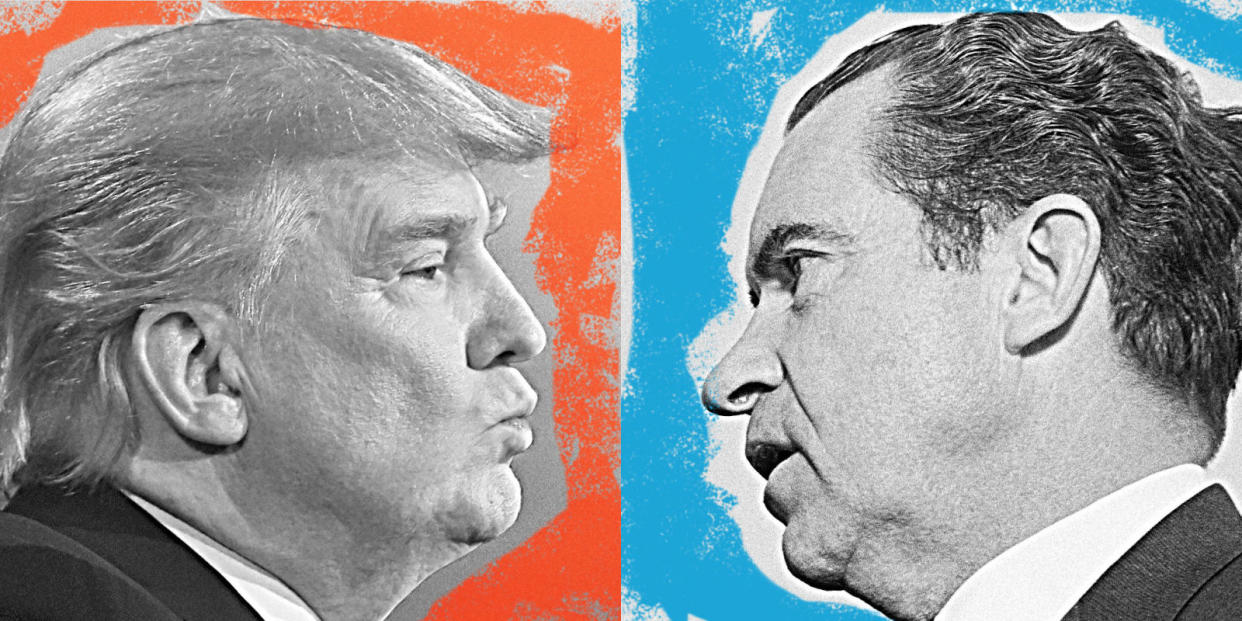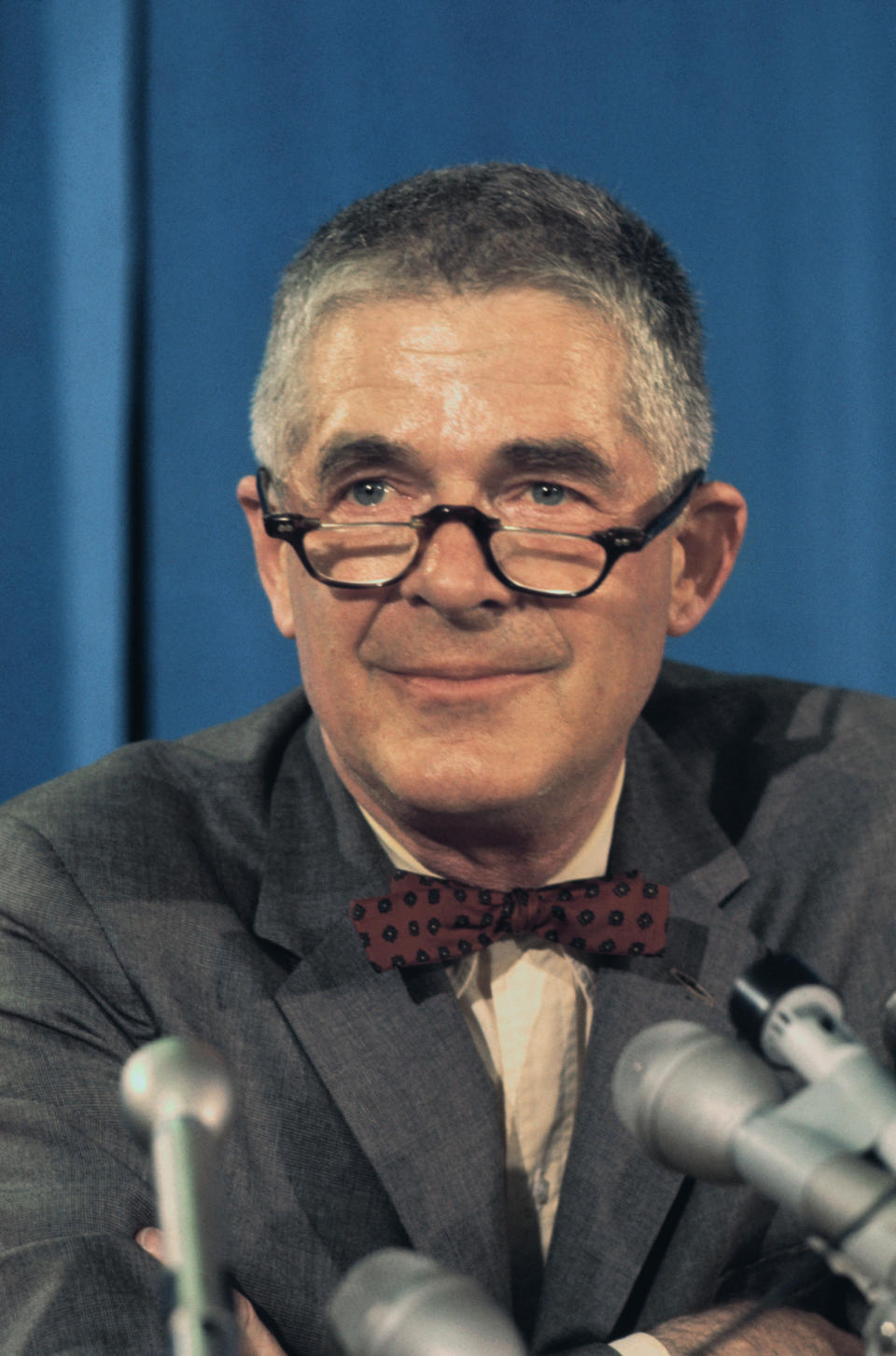Trump's Tuesday Night Massacre Brings the Watergate Comparisons Full Circle

When President Trump fired Acting Attorney General Sally Yates three months ago, the comparisons to President Nixon's Saturday Night Massacre came naturally. In that infamous incident, Nixon retaliated against Archibald Cox, the Watergate special prosecutor who had been demanding access to the president's secret recordings, demanding he be fired. Instead, the president's actions prompted his attorney general, Elliot Richardson, and his top deputy, William Ruckelshaus, to resign in protest and sparked a national furor that ultimately led to his resignation.
For many, the Yates case called back to that crisis point of Watergate. Both moments involved a serious showdown between an embattled president and the top officials at his own Department of Justice, and both culminated with dramatic nighttime dismissals of those same officials.
But as I noted at the time, there was one crucial difference: "Nixon worked to stop an investigation of his administration's own criminal activities, while Trump acted to ensure the enforcement of his executive orders. Given their targets, Nixon's purge represented a clear constitutional crisis in ways that Trump's actions, as of yet, do not." That difference is now gone.

With this afternoon's abrupt firing of FBI Director James Comey, comparisons to the Saturday Night Massacre have been widely renewed and, this time, they are warranted. Just like Nixon, Trump fired the federal official who has been leading an inquiry into his administration's alleged misdeeds. And, just like Nixon, he did so precisely as that inquiry seemed to be closing in on him. The investigated fired the investigator, and all hell is breaking loose.
That's where we stand at the moment, but the comparisons between Trump and Nixon won't end there. We should consider how the presidents acted, but we should also take note of how the nation responded.
After the Saturday Night Massacre, Americans made their fury clear. Outside the White House, pickets lined Pennsylvania Avenue, carrying signs that urged drivers to "Honk for Impeachment." As one reporter noted, from dawn to dusk there wasn't a single moment when "two to two dozen horns were not blaring out their retributive tidings."
Meanwhile, across America, ordinary citizens inundated their representatives with letters, telegrams and phone calls demanding action. Support for Nixon's impeachment, which had languished in the 20s over the previous year, suddenly shot up to a plurality. As a Newsday columnist Patrick Owens noted, something had snapped in ordinary Americans. "It just makes me sick," a drugstore clerk at told a reporter. "Impeach him," a cab driver snapped; "hell, castrate him." The nation seemed, the columnist concluded, "for the first time in years, to be speaking in something approximating a single voice. The voice said, 'Throw the bum out.'"
It seems inconceivable, but all of this surprised Richard Nixon. As he listened to the cacophony of car horns outside his White House and watched nervously as Congress began discussing his impeachment for the first time, he was deeply shaken. "I was taken by surprise by the ferocious intensity of the reaction," he later wrote. "For the first time I recognized the depth of the impact Watergate had been having on America. I suddenly realized how deeply its acid had eaten into the nation's grain."
"I was taken by surprise by the ferocious intensity of the reaction," Nixon later wrote.
According to early reports, the Trump administration has been similarly surprised by the outrage over Comey's sacking. As Dana Bash reported with astonishment on CNN, "Some senior people in the White House did not think this was going to be the political explosion that it obviously is."
It is, of course, far too soon to measure the nation's reaction with any real accuracy, but the initial responses don't bode well for the president. The cable networks have reacted with alarm, and the morning newspapers will too. Even conservative pundits have denounced the move. Charles Krauthammer called the firing "inexplicable" and implausible" while Bill Kristol retweeted his prior observation that "Trump's 1st term increasingly feels like Nixon's 2nd."
Not surprisingly, leading Democrats have denounced the Comey firing and demanded an independent investigation into Trump's ties to Russia. This, of course, points to a key difference between Nixon and Trump. Nixon confronted a House and Senate controlled by Democrats who were all too eager to act as instruments of an indignant public calling for the president's impeachment. In sharp contrast, Trump has the extreme luxury of a Republican Congress that has, so far, been reluctant to provide the most basic forms of legislative oversight. Indeed, as we saw this Monday, some senators have contorted themselves into considerable knots to shield this president from any outside inquiry.
That may well change. Senator John McCain has renewed his call for an independent inquiry, while fellow GOP committee chairmen have expressed their own concerns. More substantively, Representative Justin Amash, a member of the House Oversight Committee and a leader of the far-right Freedom Caucus, announced he was studying legislation to launch an independent investigation into Trump's ties to Russia.
The direction this now takes depends, of course, on the public's reaction. If there is a sustained demand for an independent investigation, Congress may well cave, if only to keep Trump from dragging them down with him. Representative Barbara Comstock, one of the most vulnerable Republicans in the House, issued a statement noting, "There must be an independent investigation that the American people can trust." Whatever their own motives, it seems likely that Republicans in Congress would rather throw the bum out than be thrown out themselves.
Whatever happens next, it's clear that President Trump has made history in a major way. As the Nixon Presidential Library gloated, "President Nixon never fired the Director of the FBI."
You Might Also Like


